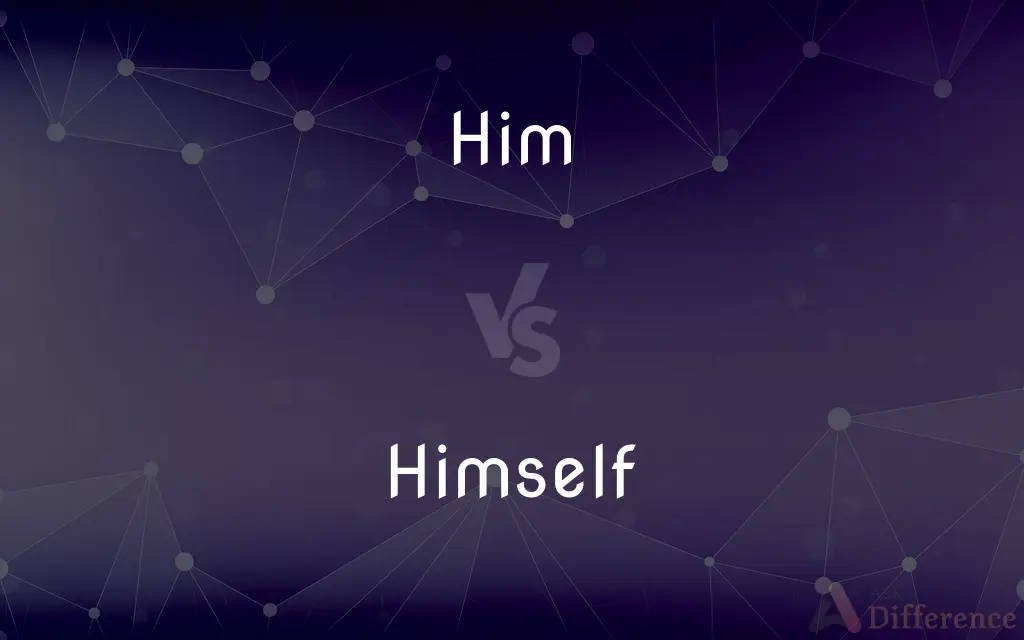Him vs. Himself — What's the Difference?
Edited by Tayyaba Rehman — By Maham Liaqat — Updated on March 13, 2024
Him is a personal pronoun used as an object, while himself is a reflexive pronoun used for emphasis or to refer back to the subject.

Difference Between Him and Himself
Table of Contents
ADVERTISEMENT
Key Differences
Him and himself are both pronouns that relate to a male subject, but they serve different functions in a sentence. Him is an object pronoun, used to refer to a male person or animal that has already been mentioned or is easily identified in the context. On the other hand, himself is a reflexive pronoun, used when the male subject of the sentence is also the object of the action. It can also be used for emphasis.
While him is used in a general sense to refer to a male person other than the speaker or the person being addressed, himself adds a level of reflexivity or emphasis, indicating that the action or situation involves the male subject directly.
In cases where emphasis is needed to clarify that the action pertains to the male subject alone, himself is the appropriate choice. For instance, saying "He himself completed the task" emphasizes that it was he, and no one else, who completed the task.
It's also worth noting that himself can be used to add emphasis even when it's not functioning as a reflexive pronoun. For example, in the sentence "He did it himself," the word himself emphasizes that he was the one who performed the action, without any help.
Comparison Chart
Type of Pronoun
Object pronoun
Reflexive pronoun
ADVERTISEMENT
Function
Serves as the object of a verb or preposition
Refers back to the subject or used for emphasis
Usage in a Sentence
"She called him yesterday."
"He introduced himself."
Emphasis
Does not provide emphasis
Can add emphasis to indicate the subject's direct involvement
Reflexivity
Not reflexive
Reflexive, relating back to the subject
Compare with Definitions
Him
An object pronoun referring to a male subject previously mentioned.
I will give him the book tomorrow.
Himself
A reflexive pronoun referring back to the male subject of the sentence.
He saw himself in the mirror.
Him
Used to indicate the male recipient of an action.
She wrote him a letter.
Himself
Used for emphasis to highlight the subject's role in the action.
He himself fixed the car.
Him
Follows prepositions to refer to a male person.
The gift is from him.
Himself
Can be used to add emphasis without reflexive meaning.
He did it himself.
Him
Serves as the indirect object in sentences.
They offered him a job.
Himself
Appears in sentences where the subject and object are the same male person.
He prepared himself for the journey.
Him
Can be used in place of a male noun.
We saw him at the party.
Himself
Reflects back on the male subject, emphasizing personal involvement.
He bought himself a new phone.
Him
A male
The dog is a him.
Himself
(reflexive pronoun) Him; the male object of a verb or preposition that also appears as the subject
He injured himself.
Him
A masculine pronoun; he as a grammatical object.
Himself
(emphatic) He; used as an intensifier, often to emphasize that the referent is the exclusive participant in the predicate
He was injured himself.
Him
With dative effect or as an indirect object.
Himself
The subject or non-reflexive object of a predicate; he himself.
Him
Following a preposition.
Himself
(Ireland) The subject or non-reflexive object of a predicate; he used of upper-class gentlemen, or sarcastically, of men who imagine themselves to be more important than others
Has himself come down to breakfast yet?
Have you seen himself yet this morning?
Him
With accusative effect or as a direct object.
Himself
An emphasized form of the third person masculine pronoun; - used as a subject usually with he; as, he himself will bear the blame; used alone in the predicate, either in the nominative or objective case; as, it is himself who saved himself.
But he himself returned from the quarries.
David hid himself in the field.
The Lord himself shall give you a sign.
Who gave himself for us, that he might . . . purify unto himself a peculiar people.
With shame remembers, while himself was oneOf the same herd, himself the same had done.
It comprehendeth in himself all good.
Him
Used reflexively: (to) himself.
Himself
One's true or real character; one's natural temper and disposition; the state of being in one's right or sane mind (after unconsciousness, passion, delirium, or abasement); as, the man has come to himself.
Him
With nominative effect: he, especially as a predicate after be, or following a preposition.
Himself
Themselves. See Hemself.
Him
Alternative case form of Him
Him
(informal) A male person or animal.
I think this bird is a him, but it may be a her.
Him
Them. See Hem.
Him
The objective case of he. See He.
Him that is weak in the faith receive.
Friends who have given him the most sympathy.
I never saw but Humphrey, duke of Gloster,Did bear him like a noble gentleman.
Common Curiosities
When is it appropriate to use "himself" in a sentence?
"Himself" is used when the subject of the sentence performs an action on himself or for adding emphasis.
How does "himself" differ from "him" in usage?
"Himself" is a reflexive pronoun used to refer back to the subject of the sentence or for emphasis, whereas "him" is an object pronoun.
What is an example of "himself" being used reflexively?
An example is "He taught himself to play the guitar."
How does the role of "him" in a sentence compare to that of "himself"?
"Him" serves as the object of a verb or preposition, while "himself" can be reflexive or used for emphasis.
Can "himself" be used for emphasis?
Yes, "himself" can be used to add emphasis, indicating that the subject personally performed an action.
Is "him" ever used as a subject pronoun?
No, "him" is always used as an object pronoun and never as a subject pronoun.
In what situations is "him" typically used in a sentence?
"Him" is typically used as the object of a verb or preposition, referring to a male person.
What is the primary function of "him" in a sentence?
"Him" is used as an object pronoun to refer to a male person or entity mentioned earlier in the discourse.
Can "himself" be used in place of "him" for emphasis?
Yes, "himself" can replace "him" to add emphasis, especially when highlighting the subject's direct involvement in an action.
Is it grammatically correct to use "himself" in a sentence without a preceding subject?
No, "himself" should refer back to a male subject mentioned earlier in the sentence.
Can "him" follow a preposition in a sentence?
Yes, "him" can follow a preposition, acting as the object of the preposition.
Can "him" be used to refer to both humans and animals?
Yes, "him" can refer to both male humans and male animals.
Is "him" used in formal or informal language?
"Him" is used in both formal and informal language as an object pronoun.
How does "himself" enhance the clarity of a sentence?
"Himself" can clarify that the male subject is performing an action on himself or emphasize the subject's role in the action.
What is the significance of using "himself" in a narrative?
Using "himself" can add depth to a narrative by highlighting personal involvement or self-directed actions of a male character.
Share Your Discovery

Previous Comparison
Sweet vs. Tart
Next Comparison
Layout vs. PlanAuthor Spotlight
Written by
Maham LiaqatEdited by
Tayyaba RehmanTayyaba Rehman is a distinguished writer, currently serving as a primary contributor to askdifference.com. As a researcher in semantics and etymology, Tayyaba's passion for the complexity of languages and their distinctions has found a perfect home on the platform. Tayyaba delves into the intricacies of language, distinguishing between commonly confused words and phrases, thereby providing clarity for readers worldwide.















































